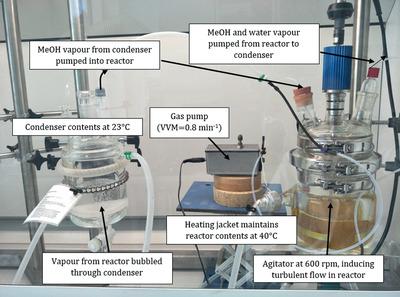当前位置:
X-MOL 学术
›
Biotechnol. Appl. Bioc.
›
论文详情
Our official English website, www.x-mol.net, welcomes your
feedback! (Note: you will need to create a separate account there.)
Combining technology with liquid-formulated lipases for in-spec biodiesel production
Biotechnology and Applied Biochemistry ( IF 3.2 ) Pub Date : 2020-11-11 , DOI: 10.1002/bab.2074 Chinmayi Bhatt 1 , Per Munk Nielsen 2 , Anders Rancke-Madsen 2 , John M Woodley 1
Biotechnology and Applied Biochemistry ( IF 3.2 ) Pub Date : 2020-11-11 , DOI: 10.1002/bab.2074 Chinmayi Bhatt 1 , Per Munk Nielsen 2 , Anders Rancke-Madsen 2 , John M Woodley 1
Affiliation

|
Enzymatic biodiesel production has been at the forefront of biofuels research in recent decades because of the significant environmental advantages it offers, while having the potential to be as effective as conventional chemically catalyzed biodiesel production. However, the higher capital cost, longer reaction time, and sensitivity of enzyme processes have restricted their widespread industrial adoption so far. It is also posited that the lack of research to bring the biodiesel product into final specification has scuppered industrial confidence in the viability of the enzymatic process. Furthermore, the vast majority of literature has focused on the development of immobilized enzyme processes, which seem too costly (and risky) to be used industrially. There has been little focus on liquid lipase formulations such as the Eversa Transform 2.0, which is in fact already used commercially for triglyceride transesterification. It is the objective of this review to highlight new research that focuses on bringing enzymatically produced biodiesel into specification via a liquid lipase polishing process, and the process considerations that come with it.
中文翻译:

将技术与液体配方脂肪酶相结合,生产符合规格的生物柴油
近几十年来,酶促生物柴油生产一直处于生物燃料研究的前沿,因为它具有显着的环境优势,同时具有与传统化学催化生物柴油生产一样有效的潜力。然而,迄今为止,酶工艺较高的资本成本、较长的反应时间和敏感性限制了它们在工业上的广泛应用。还假设缺乏将生物柴油产品纳入最终规格的研究已经破坏了工业界对酶促工艺可行性的信心。此外,绝大多数文献都集中在固定化酶工艺的开发上,这似乎太昂贵(和风险)而无法在工业上使用。很少有人关注液体脂肪酶制剂,例如Eversa Transform 2.0实际上已经在商业上用于甘油三酯酯交换。这篇综述的目的是强调新的研究,这些研究的重点是通过液体脂肪酶抛光工艺将酶法生产的生物柴油纳入规格,以及随之而来的工艺注意事项。
更新日期:2020-11-11
中文翻译:

将技术与液体配方脂肪酶相结合,生产符合规格的生物柴油
近几十年来,酶促生物柴油生产一直处于生物燃料研究的前沿,因为它具有显着的环境优势,同时具有与传统化学催化生物柴油生产一样有效的潜力。然而,迄今为止,酶工艺较高的资本成本、较长的反应时间和敏感性限制了它们在工业上的广泛应用。还假设缺乏将生物柴油产品纳入最终规格的研究已经破坏了工业界对酶促工艺可行性的信心。此外,绝大多数文献都集中在固定化酶工艺的开发上,这似乎太昂贵(和风险)而无法在工业上使用。很少有人关注液体脂肪酶制剂,例如Eversa Transform 2.0实际上已经在商业上用于甘油三酯酯交换。这篇综述的目的是强调新的研究,这些研究的重点是通过液体脂肪酶抛光工艺将酶法生产的生物柴油纳入规格,以及随之而来的工艺注意事项。











































 京公网安备 11010802027423号
京公网安备 11010802027423号